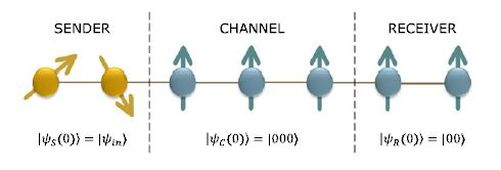A simple quantum wire for complex quantum states
The emergence of quantum technologies, from the challenge of building a scalable quantum computer to that of developing quantum imaging devices, requires reliable information transfer between the different components of the system. Namely, it is essential to have a quantum data bus capable of transmitting arbitrary quantum states with very high fidelity. A very promising solution is the use of quantum spin chains as passive data wires, where one can place a qubit state at one end of the chain and let its natural spin dynamics transfer the quantum state to the other end of the chain. This does not require any external control, except at initialization and readout.
Naturally, the usefulness of the realization of spin chains as an effective quantum data bus depends on whether quantum states can be transferred with high fidelity through the chain. However, there are additional important concerns. Firstly, it is important that the realization of the chain does not require much engineering of the interqubit couplings. Secondly, the chain should be able to transmit not only single-qubit states but also multi-qubit entangled and unentangled states. This motivated the work of R. Sousa and Y. Omar, of the Physics of Information and Quantum Technologies Group at Instituto de Telecomunicações, who have studied the transfer of multi-qubit entangled and unentangled states through spin chains whose couplings are totally uniform.
Naturally, the usefulness of the realization of spin chains as an effective quantum data bus depends on whether quantum states can be transferred with high fidelity through the chain. However, there are additional important concerns. Firstly, it is important that the realization of the chain does not require much engineering of the interqubit couplings. Secondly, the chain should be able to transmit not only single-qubit states but also multi-qubit entangled and unentangled states. This motivated the work of R. Sousa and Y. Omar, of the Physics of Information and Quantum Technologies Group at Instituto de Telecomunicações, who have studied the transfer of multi-qubit entangled and unentangled states through spin chains whose couplings are totally uniform.
The spin chain quantum channel can transmit
entangled quantum states with fidelity arbitrarily close to 1.
entangled quantum states with fidelity arbitrarily close to 1.
It has previously been established that state transfer cannot be achieved with perfect fidelity in such uniform chains, even in the simpler case of single-qubit states. Notwithstanding, R. Sousa and Y. Omar demonstrated that, if one makes a small relaxation in this fidelity requirement, it is possible to have state transfer of any multi-particle state through the uniform chain, with fidelity arbitrarily close to one. This is true even for very long chains, as long as the length of the chain is adequately chosen. Their results are reported in the article Pretty good state transfer of entangled states through quantum spin chains, published in the New Journal of Physics.
Given that most quantum information processing tasks do not require perfect transfer, their results indicate that a uniform coupling configuration represents a natural choice for the design of universal quantum wires, thus facilitating their practical implementation. In fact, uniform coupling schemes govern the natural dynamics of several experimental quantum platforms. Recent developments in solid and liquid nuclear magnetic resonance, ultracold atoms in optical lattices, photonic waveguide lattices, as well as atomic nanomagnets, all open way for the experimental implementation of this proposal. Moreover, since R. Sousa and Y. Omar find that, in their protocol, the transfer fidelity depends on primality constraints, their work also highlights that there is a remarkable connection between quantum dynamics and prime numbers, which goes beyond the well-known results in the field of quantum algorithms, and which could be explored as a new paradigm to tackle challenging problems in number theory.
For more details, see the article:
R. Sousa, Y. Omar, Pretty good state transfer of entangled states through quantum spin chains, New J. Phys. 16, 123003 (2014). Get PDF
